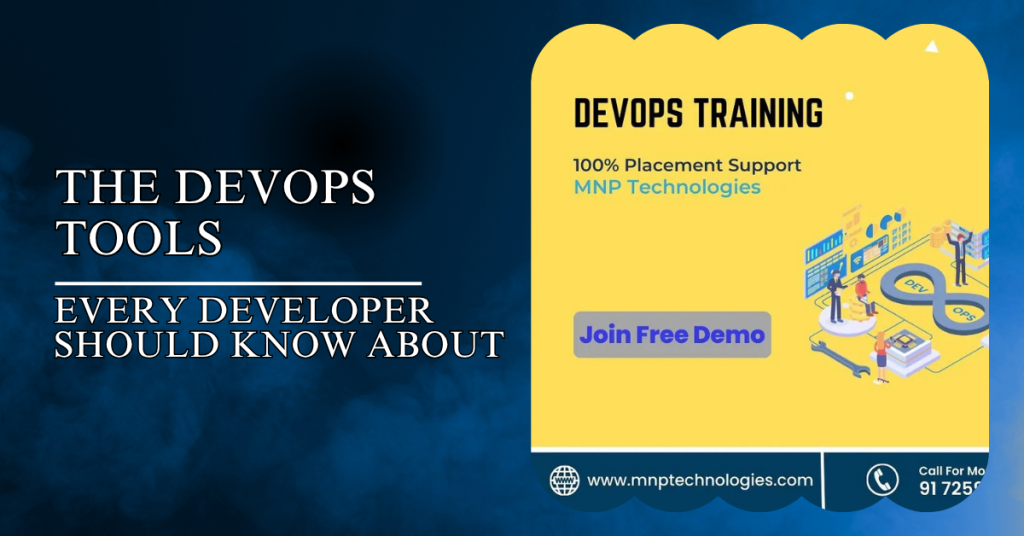The technology landscape is constantly evolving, and DevOps has emerged as a game-changer in how organizations develop and maintain software. If you’re looking to build a career in IT, DevOps is a fantastic option to explore. The statistics speak for themselves as back in 2019, the DevOps market was valued at over $4 billion, and it’s expected to grow by more than 20% annually until 2026. This rapid growth shows that the demand for DevOps professionals is on the rise, making it a great time to dive into this field.
But how do you start? DevOps is all about streamlining the collaboration between development and operations, and it heavily relies on tools to simplify processes. Understanding these tools is key to success.
What is DevOps?
Before learning about the different tools, let’s understand what DevOps is. DevOps is a combination of software development (Dev) and IT operations (Ops). It emphasizes collaboration, automation, and seamless communication between teams to ensure that software is delivered quickly, efficiently, and with minimal errors.
The goal of DevOps is to eliminate the silos between development and operations, leading to faster releases, improved reliability, and greater efficiency. DevOps tools play a central role in making this possible by automating tasks, improving workflows, and ensuring consistency.
Why Is It Important to Know About the DevOps Tools?
DevOps tools are the backbone of the entire process. They help developers write, test, deploy, and monitor software more efficiently. By automating repetitive tasks and enabling better collaboration, these tools allow teams to focus on innovation and problem-solving.
If you’re a developer or aspiring DevOps professional, familiarizing yourself with these tools is a must. Let’s look at five of the most popular DevOps tools you need to know.
5 Popular DevOps Tools Every Developer Should Know
Git
Git is the go-to tool for version control. It helps developers track changes, collaborate on projects, and maintain a history of their codebase. With Git, you can experiment with confidence, knowing that you can easily revert to a previous version if needed.
Jenkins
Jenkins is one of the most widely used tools in the DevOps ecosystem. It’s an open-source automation server that supports tasks like building, testing, and deploying software. The best part about Jenkins is its extensive plugin ecosystem, which makes it highly flexible and adaptable to various technologies and workflows.
Docker
Docker is a game-changer for developers. It allows you to package applications into containers, ensuring that your software runs the same way regardless of the environment. This consistency eliminates the common “it works on my machine” issue, making Docker a favorite among teams.
Kubernetes
While Docker handles containerization, Kubernetes manages those containers. It ensures that your applications are scalable, resilient, and easy to manage by automating tasks like load balancing, scaling, and recovery. Kubernetes is essential for any developer working with containerized applications.
Ansible
Ansible simplifies infrastructure management and automation. It’s a powerful tool for tasks like deploying applications, managing configurations, and updating systems. Ansible’s simple and straightforward design makes it a great choice for both beginners and experienced professionals.
What’s Next After Learning About DevOps Tools?
Knowing about the tools is just the beginning. To become a skilled DevOps professional, you need hands-on experience and practical knowledge. Theoretical understanding is valuable, but real growth happens when you work on real-world projects and face challenges head-on.
This is where choosing the right training institute becomes crucial. The right guidance can make all the difference in building your confidence and expertise in DevOps.
Why Choose MNP Technologies?
If you’re searching for the best DevOps training institute in Marathahalli, Bangalore, MNP Technologies is an excellent choice. Here’s why they stand out:
- Expert Trainers: The trainers at MNP Technologies are experienced professionals who bring real-world knowledge to the classroom. They guide you through the practical aspects of DevOps tools and processes.
- Hands-On Learning: The courses emphasize practical training, allowing you to work with tools like Jenkins, Docker, and Kubernetes. This hands-on experience ensures you’re job-ready.
- Flexible Schedules: MNP Technologies offers various training schedules, including regular classes, weekend sessions, and online training. You can choose the option that works best for you.
- Placement Support: The institute provides placement assistance, helping you secure opportunities with top companies in the industry.
Whether you’re a fresher or a professional looking to upskill, MNP Technologies offers the perfect blend of theoretical knowledge and practical training to kickstart your DevOps journey.
The Future of DevOps
DevOps is more than just a buzzword, it’s a culture that’s transforming how organizations approach software development and operations. By bridging the gap between teams, it ensures faster delivery, higher reliability, and greater efficiency.
As technology continues to evolve, the demand for skilled DevOps professionals will only grow. Learning about the essential tools is your first step, but practical training is what sets you apart in this competitive field.
By investing time and effort into understanding DevOps and its tools, you’re setting yourself up for a rewarding career in one of the most exciting areas of IT. So, take the leap, explore the tools, and start your journey toward becoming a DevOps expert.

